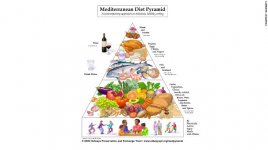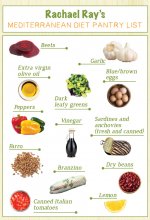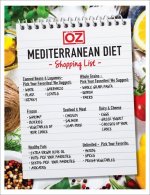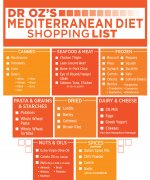David Baxter PhD
Late Founder
The Best Diets of 2018
BerkeleyWellness.com
March 16, 2018
Looking for the best diet for weight loss, heart health, preventing or managing diabetes—or just for healthy eating in general? And one that will be easy to follow? What about the best plant-based diet? Or the best commercial diet plan? Every year, U.S. News & World Report ranks popular diets by such criteria. For the 2018 report, released earlier this year, 40 diets in total were evaluated across nine categories.
To determine the rankings, a panel of health experts in such fields as nutrition, weight management, diabetes, and public health assessed the diets’ nutritional completeness, effectiveness, ease of use, and potential risks, based on the medical literature, government reports, and other sources. They also ascertained whether claims made for the diets were valid or not. Among the 25 experts who weighed in were Penny Kris-Etherton, Ph.D., R.D., professor of nutrition at Pennsylvania State University; James Levine, M.D., Ph.D., an obesity expert and endocrinologist at the Mayo Clinic; and Eric Rimm, Sc.D., professor of epidemiology and nutrition at Harvard.
The top two diets
Tied for #1 in Best Diets Overall were the DASH Diet and the Mediterranean Diet, which have many similarities, notably their emphases on plant foods, including whole grains, vegetables, fruits, and legumes (beans, lentils), along with some fish, chicken, and other lean animal protein. Other key elements of the Mediterranean Diet are olive oil and red wine in moderation, while DASH (which stands for “dietary approaches to stop hypertension”) emphasizes dairy foods and has a daily sodium limit of 1,500 to 2,300 milligrams to help lower blood pressure.
These two diets reflect the advice we’ve been giving for healthy eating for years. Though DASH was not originally designed for weight loss, it may have this (and other) fortuitous effects, while the Mediterranean Diet has been linked to a range of potential benefits, from reduced risk of heart attacks and strokes to better cognition and possibly even longer life.
Other top rankers
Here’s a brief look at some of the other diets that ranked high across several categories, all of which we endorse for their nutritional soundness and potential health benefits.
The Worst Diets of 2018
In the latest rankings of popular diet plans from U.S. News World Report, the Keto Diet and the Dukan Diet scored at the bottom in Best Diets Overall and Best Diets for Healthy Eating.
By eating a lot of fat (over 70 percent of calories in some plans) and very few carbs, the Keto Diet puts your body into a state of ketosis as fat is burned instead of carbohydrates. You’ll lose weight, at least in the short term, though much of this will be water that is excreted when the body is in ketosis. That water weight will be regained when you start eating carbs again. People with kidney or liver problems should avoid this diet. It’s still unknown if the diet is beneficial or risky for people with diabetes or heart disease; more research is needed.
The Keto Diet — which comes out of therapeutic diets used for seizures and possibly other neurologic conditions, done under medical supervision — also scored low in other categories: #38 in Easiest Diets to Follow; #35 in Best Heart-Healthy Diet; #33 in Best Diabetes Diets; and #23 in Best Weight-Loss Diets.
You might also lose some weight on the high-protein/low-carb Dukan diet (named after the French doctor who developed it), but as we’ve reported before, the strict rules can be very hard to follow. More critical, Dukan ranked low because nutritional deficiencies can occur when cutting out entire food groups, and there are health concerns about eating too much protein.
Dukan was deemed #37 in Best Diets for Diabetes; #36 in Easiest Diets to Follow; and #30 in Best Weight-Loss Diets. Other low-scoring diets overall included Whole30, Body Reset, Atkins, Supercharged Hormone, Raw Food, Paleo, Acid Alkaline, Medifast, and HMR.
Bottom line:
There is no one diet for everyone — but there are several good options to choose from, depending on your primary goals and your individual preferences (and a number of diets to be cautious about). If you are looking to improve your eating habits, choose a diet (or even a combination of diets) that works best for you, meaning one that you can follow relatively easily, is enjoyable or at least satisfying enough, and can be sustained over the long term, which are the keys to any successful eating plan.
Among the diets that top the 2018 “best” lists in several categories are the Mediterranean, DASH, Flexitarian, and Volumetrics, making them good diets to start with if they appeal to you. Whatever diet you opt for, a registered dietitian (RD) can help you modify it if necessary and help you stay the course.
Also see 18 Keys to Healthy Weight Loss.
BerkeleyWellness.com
March 16, 2018
Looking for the best diet for weight loss, heart health, preventing or managing diabetes—or just for healthy eating in general? And one that will be easy to follow? What about the best plant-based diet? Or the best commercial diet plan? Every year, U.S. News & World Report ranks popular diets by such criteria. For the 2018 report, released earlier this year, 40 diets in total were evaluated across nine categories.
To determine the rankings, a panel of health experts in such fields as nutrition, weight management, diabetes, and public health assessed the diets’ nutritional completeness, effectiveness, ease of use, and potential risks, based on the medical literature, government reports, and other sources. They also ascertained whether claims made for the diets were valid or not. Among the 25 experts who weighed in were Penny Kris-Etherton, Ph.D., R.D., professor of nutrition at Pennsylvania State University; James Levine, M.D., Ph.D., an obesity expert and endocrinologist at the Mayo Clinic; and Eric Rimm, Sc.D., professor of epidemiology and nutrition at Harvard.
The top two diets
Tied for #1 in Best Diets Overall were the DASH Diet and the Mediterranean Diet, which have many similarities, notably their emphases on plant foods, including whole grains, vegetables, fruits, and legumes (beans, lentils), along with some fish, chicken, and other lean animal protein. Other key elements of the Mediterranean Diet are olive oil and red wine in moderation, while DASH (which stands for “dietary approaches to stop hypertension”) emphasizes dairy foods and has a daily sodium limit of 1,500 to 2,300 milligrams to help lower blood pressure.
These two diets reflect the advice we’ve been giving for healthy eating for years. Though DASH was not originally designed for weight loss, it may have this (and other) fortuitous effects, while the Mediterranean Diet has been linked to a range of potential benefits, from reduced risk of heart attacks and strokes to better cognition and possibly even longer life.
Other top rankers
Here’s a brief look at some of the other diets that ranked high across several categories, all of which we endorse for their nutritional soundness and potential health benefits.
- The Flexitarian Diet. Developed by a registered dietitian in 2009, this diet (whose name comes from combining the words flexible and vegetarian) emphasizes plant-based foods, including good protein sources like tofu (soy), lentils, and beans, while allowing for some animal foods on occasion, as desired. For instance, you might use soy milk in place of cow’s milk in your breakfast cereal and have a veggie burger at lunch, but then add a little chicken or fish to a vegetable stew for dinner some nights of the week.
A perk of the “nutritionally sound” Flexitarian Diet is that you might also lose some weight, since even semi-vegetarians tend to weigh less than their full-fledged carnivorous counterparts. The diet ranked #2 in Best Plant-Based Diets and Easiest Diets to follow; #3 in Best Diets Overall, Best Diets for Healthy Eating, and Best Diabetes Diets; and #5 in Best Heart-Healthy Diets and Best Weight-Loss Diets.
- Volumetrics. One of our favorite diets is Volumetrics, developed by Barbara Rolls, Ph.D., at Pennsylvania State University. It emphasizes foods that have a low energy density (that is, are low in calories relative to their weight or volume) because they are either high in water (such as fruits, nonstarchy vegetables, broth-based soups, cooked pasta and other grains, and yogurt) or in air (such as popcorn and whipped beverages).
The idea is that people tend to consume about the same amount of food (by weight, volume, or both) every day, regardless of the total calories. And people feel more satisfied when they perceive they are consuming a larger amount of food or fluid (compared to a smaller amount with the same number of calories). Basically, it means being able to fill your plate with more food, so you are more satisfied with fewer calories. Volumetrics ranked #2 in Best Weight-Loss Diets; #3 in Best Diabetes Diets; and #5 in Best Diets Overall.
- Weight Watchers. The Weight Watchers Program uses a SmartPoints system, which takes into account a food’s nutritional composition (rather than just its calories) and also involves making behavioral and mindset changes. The diet encourages eating more fruits, vegetables, and lean protein and discourages sugary and other unhealthy foods, but it doesn’t ban any foods. U.S. News & World Report evaluated the Weight Watchers Beyond the Scale Program, begun in 2015, but that has recently been updated to WW Freestyle, which assigns zero points to over 200 foods, making the diet even more manageable.
Weight Watchers ranked #1 in Best Weight-Loss Diets and Best Commercial Diet Plans; #2 in Easiest Diets to follow; #3 in Best Diabetes Diets; #4 in Best Diets Overall; and #5 in Best Diets for Healthy Eating. It ranked only #14, however, in Best Heart-Healthy Diets. Jenny Craig also ranked high for weight loss: #2 in Best Commercial Diet Plans and #3 in Best Weight-Loss Diets (but #20 in Best Heart-Healthy Diets).
- MIND Diet. This relatively new diet, developed at Rush University Medical Center in Chicago, takes elements from both the DASH and Mediterranean diets. As we’ve reported before, the MIND Diet has shown promising brain benefits in observational studies, in terms of being able to preserve cognitive health and possibly even reduce the risk of dementia. It ranked #5 in Best Diets Overall, Best Diets for Healthy Eating, Best Heart-Healthy Diets, and Easiest Diets to Follow. (Note that U.S. News & World Report had no diet category specifically for cognitive functioning.) The diet, however, is not ranked high for weight loss (#23).
- Ornish Diet. Once all the rage for heart health, the Ornish Diet (now referred to as the Ornish Spectrum) is still recognized as a heart-healthy way to eat, with evidence showing that it may promote regression of plaque in arteries in people with atherosclerosis. This extremely low-fat diet (less than 10 percent of calories from fat) consists of fruits, vegetables, whole grains, and legumes, with a focus on whole unprocessed foods. In addition, it emphasizes a “spectrum” of lifestyle elements including moderate exercise, stress management (such as with meditation or yoga), and social support, all of which also contribute to heart health. The Ornish Diet ranked #2 in Best Heart-Healthy Diets and #3 in Best Plant-Based Diets. The problem: It is a challenge to follow, especially over the long term. Not surprisingly, it ranked #24 in Easiest Diets to Follow.
The Worst Diets of 2018
In the latest rankings of popular diet plans from U.S. News World Report, the Keto Diet and the Dukan Diet scored at the bottom in Best Diets Overall and Best Diets for Healthy Eating.
By eating a lot of fat (over 70 percent of calories in some plans) and very few carbs, the Keto Diet puts your body into a state of ketosis as fat is burned instead of carbohydrates. You’ll lose weight, at least in the short term, though much of this will be water that is excreted when the body is in ketosis. That water weight will be regained when you start eating carbs again. People with kidney or liver problems should avoid this diet. It’s still unknown if the diet is beneficial or risky for people with diabetes or heart disease; more research is needed.
The Keto Diet — which comes out of therapeutic diets used for seizures and possibly other neurologic conditions, done under medical supervision — also scored low in other categories: #38 in Easiest Diets to Follow; #35 in Best Heart-Healthy Diet; #33 in Best Diabetes Diets; and #23 in Best Weight-Loss Diets.
You might also lose some weight on the high-protein/low-carb Dukan diet (named after the French doctor who developed it), but as we’ve reported before, the strict rules can be very hard to follow. More critical, Dukan ranked low because nutritional deficiencies can occur when cutting out entire food groups, and there are health concerns about eating too much protein.
Dukan was deemed #37 in Best Diets for Diabetes; #36 in Easiest Diets to Follow; and #30 in Best Weight-Loss Diets. Other low-scoring diets overall included Whole30, Body Reset, Atkins, Supercharged Hormone, Raw Food, Paleo, Acid Alkaline, Medifast, and HMR.
Bottom line:
There is no one diet for everyone — but there are several good options to choose from, depending on your primary goals and your individual preferences (and a number of diets to be cautious about). If you are looking to improve your eating habits, choose a diet (or even a combination of diets) that works best for you, meaning one that you can follow relatively easily, is enjoyable or at least satisfying enough, and can be sustained over the long term, which are the keys to any successful eating plan.
Among the diets that top the 2018 “best” lists in several categories are the Mediterranean, DASH, Flexitarian, and Volumetrics, making them good diets to start with if they appeal to you. Whatever diet you opt for, a registered dietitian (RD) can help you modify it if necessary and help you stay the course.
Also see 18 Keys to Healthy Weight Loss.





